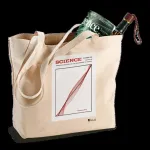(Press-News.org) Highlights:
Antimicrobial resistance is a growing threat.
Bacteria exchange AMR genes in the gut via circular genetic material called plasmids.
In lab experiments, bacteria transferred plasmids with AMR genes in the presence of zinc at reduced or nonexistent rates.
Stopping the transfer without killing microbes may help reduce AMR without disrupting the gut microbiome.
Washington, D.C.—Genes responsible for antimicrobial resistance (AMR) can spread from microbe to microbe through circular genetic material called plasmids, and this lateral transfer occurs in the gut. This week in Applied and Environmental Microbiology, researchers in Iowa report that the transmission of some AMR plasmids may be inhibited by a readily available source—dietary zinc supplements.
“This is the first time where we’ve discovered that zinc inhibits the process of plasmid transfer, and at lower concentrations it has minimal effect on bacteria” said microbiologist and senior author on the study Melha Mellata, Ph.D., at Iowa State University. That’s important, she said, because killing gut bacteria might disrupt the microbiome, which could have downstream ill effects on a person’s health. “But if we just prevent the plasmid transfer, then we can reduce the spread of antimicrobial resistance.”
AMR infections are a growing problem. Millions of people are diagnosed with AMR infections every year and 35,000 people die from them, according to the Centers for Disease Control and Prevention. When bacteria transfer AMR genes, Mellata said, they often transfer resistance to multiple drugs, which means that a person might have a resistant infection even before they receive antibiotics. Stopping the transfer of plasmids could help slow the spread of AMR genes.
Researchers in Mellata’s lab have been investigating how gut microbiome health relates to overall health. In a recent study, however, they found that when both probiotics and a live Salmonella vaccine were given orally to chickens, the Enterobacteriaceae bacteria in the animal gut had fewer plasmids. That observation, Mellata said, prompted them to consider testing other oral treatments to inhibit plasmid transfer.
Logan Ott, a researcher in Mellata’s lab, led the work on the study. He and a team of undergraduates collected readily available supplements to test their potential ability to inhibit plasmid transfer. They dissolved the products in test solution, then ran hundreds of reactions in which avian pathogenic Escherichia coli containing a multi-drug resistant plasmid conjugated with a plasmid-free human E. coli isolate.
They found a sharp drop in plasmid transmission in bacterial strains supplemented with zinc, compared to bacterial strains without zinc. In addition, higher doses of zinc correlated to lower levels of plasmid transmission. Those observations were promising, Ott said, but also a little mysterious. Previous studies had observed that heavy metals could induce the conjugation process that resulted in plasmid transfer. The group then used qPCR to take a closer look at how the zinc affected the process at the level of genes.
“We found some pretty unique mechanisms on how zinc might actually be inducing this inhibition when previous literature would state that we should expect more,” Ott said. Their analysis showed that the zinc induced overexpression of replication genes—so much so that it likely overloaded and inhibited the process. They also found that while zinc did seem to promote the genes responsible for conjugation, the mineral inhibited specific proteins required to build the bacterial structures used in conjugation. As a result, the overall process of transmission was stymied.
The next steps, Mellata said, include testing the transfer of plasmids with other AMR genes and experimenting with animal models to see if the lab results also hold in vivo. Ott noted that scientists’ understanding of how bacteria interact and share genes in the gut is poorly understood, and future studies could help elucidate some of those mechanisms.
Mellata is particularly encouraged that such an inexpensive, readily available supplement—zinc—may play a role in addressing an emerging threat. “Sometimes the solution can be just to use the old stuff we already have in our closet,” she said. “We just have to make the effort to test it.”
###
The American Society for Microbiology is one of the largest professional societies dedicated to the life sciences and is composed of over 32,000 scientists and health practitioners. ASM's mission is to promote and advance the microbial sciences.
ASM advances the microbial sciences through conferences, publications, certifications, educational opportunities and advocacy efforts. It enhances laboratory capacity around the globe through training and resources. It provides a network for scientists in academia, industry and clinical settings. Additionally, ASM promotes a deeper understanding of the microbial sciences to diverse audiences.
END
In lab tests, dietary zinc inhibits AMR gene transmission
2024-10-03
ELSE PRESS RELEASES FROM THIS DATE:
Two UMD Astronomy space probes advance to next round of $1 billion NASA mission selection
2024-10-03
On October 3, 2024, NASA announced that two space probes proposed by University of Maryland astronomers have advanced to the next round of consideration for a $1 billion mission slated to launch into orbit in 2032.
The selected probes include the Advanced X-ray Imaging Satellite (AXIS) mission with UMD Astronomy Professor Christopher Reynolds as its principal investigator and the PRobe far-Infrared Mission for Astrophysics (PRIMA) with UMD Astronomy Professor Alberto Bolatto as a co-investigator and NASA Goddard Space Flight Center researcher and UMD Astronomy ...
New MSU research sheds light on impact and bias of voter purging in Michigan
2024-10-03
MSU has a satellite uplink/LTN TV studio and Comrex line for radio interviews upon request.
Images and Podcast
EAST LANSING, Mich. – In recent years, some states have prioritized purging their voter rolls of those who have passed away or moved out of state. During election season, there is often increased discussion about the necessity and impact of these actions. Voter purging can be an important step for creating election integrity, but others have raised concerns about how the process is conducted and who it targets.
So, are there negative effects of voter purging? Researchers from Michigan State University wanted to find out — especially ...
Funding to create world's first ovarian cancer prevention vaccine
2024-10-03
In this study, the Cancer Research UK-funded scientists will establish the targets for the vaccine. They will find out which proteins on the surface of early-stage ovarian cancer cells are most strongly recognised by the immune system and how effectively the vaccine kills mini-models of ovarian cancer called organoids.
If this research is successful, work will then begin on clinical trials of the vaccine. The hope is that in the future, women could be offered this vaccine to prevent ovarian cancer in the first place.
There are around 7,500 new ovarian ...
Scientists develop novel method for strengthening PVC products
2024-10-03
COLUMBUS, Ohio – Researchers have developed a way to make one type of plastic material more durable and less likely to shed dangerous microplastics.
The study identified a secure way to attach chemical additives to polyvinyl chloride (PVC).
Found in everything from toys, construction supplies and medical packaging, PVC plastics currently rank third among the most used plastics worldwide. Despite its widespread use, pure PVC is brittle and sensitive to heat, and manufacturers can only utilize it after stabilizing its properties with other chemicals.
However, these additives, or plasticizers, ...
Houston Methodist part of national consortium to develop vaccine against herpesviruses
2024-10-03
Houston Methodist researchers will be part of a national consortium funded by an up to $49 million award from the U.S. Government’s Advanced Research Projects Agency for Health (ARPA-H) to develop a vaccine against two of the most common and destructive strains of herpesviruses that latently infect a majority of Americans and can lead to acute infections, multiple forms of cancer, autoimmune disease and birth defects.
The award is part of ARPA-H’s Antigens Predicted for Broad Viral Efficacy through Computational Experimentation (APECx) program and will fund the America’s SHIELD project ...
UT Health San Antonio School of Dentistry earns first NIH grant under new center for pain therapeutics and addiction research
2024-10-03
SAN ANTONIO, Oct. 3, 2024 – The School of Dentistry at The University of Texas Health Science Center at San Antonio (UT Health San Antonio) earned the first National Institutes of Health grant under its new Center for Pain Therapeutics and Addiction Research, addressing pain in patients with head and neck carcinoma.
The nearly $600,000 grant by the NIH’s National Institute of Dental and Craniofacial Research will address this critical pain issue that significantly impairs quality of life. Many head and neck carcinoma patients require opiate pain management, but tolerance develops quickly, requiring new pain ...
Do MPH programs prepare graduates for employment in today's market? Mostly yes, but who is hiring may be surprising
2024-10-03
Public health degree programs provide key competencies demanded by employers, but graduate employability could be improved by using more real-time data from employer job postings, according to a new study at Columbia University Mailman School of Public Health. This could help public health schools and programs ensure that graduates obtain specific technical skills listed in job postings, meet current employer needs, and prepare graduates for the demands of today’s labor market. The findings are published in the American Journal of Public Health.
The competencies required for the ...
New article provides orientation to using implementation science in policing
2024-10-03
Since the 2020 murder by Minneapolis police of George Floyd brought nationwide calls for change amid concerns that prevailing practices were not grounded in evidence and created harm, policing has been in turmoil. Implementation science (IS) involves integrating effective and evidence-based innovations into routine practice in fields like health care. Yet despite its potential, IS—and specifically, evidence-based policing (EBP)—remain vastly understudied and unused in police settings. In a new article, researchers provide an orientation to these issues ...
Three beer-related discoveries to celebrate Oktoberfest
2024-10-03
Frothy or smooth, bitter or sweet, light or dark: There’s a beer for most palates. As people around the world pour over the best brews at Oktoberfest celebrations or ferment about their favorite fall-themed beers, three papers published in ACS journals crack open new insights into these beverages. And if you’re hop-ing to conduct studies to find which beer is good for what ales you, please drink responsibly. Reporters can request free access to these papers by emailing newsroom@acs.org.
Coriander’s origin changes beer flavor. Just like simmering a stew, brewing a beer with herbs and spices can enhance its flavor. A study in ACS Food Science ...
AAAS launches user research project to inform the new AAAS.org
2024-10-03
Washington, D.C. — The American Association for the Advancement of Science, one of the world’s largest general scientific societies and publisher of the Science family of journals, announces an external research project to help the organization reimagine AAAS.org as part of a website overhaul project, which recently kicked off. AAAS is seeking input from its key audiences, including reporters and public information officers, to better align the experience and content of the website. As AAAS embarks on the next ...


